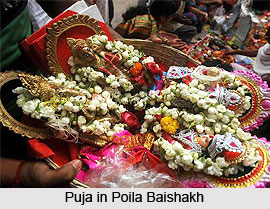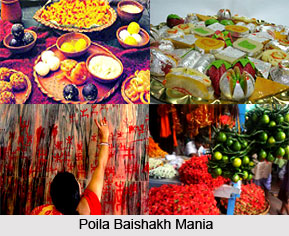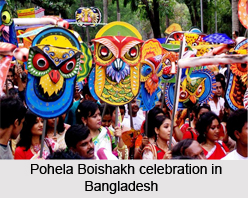 Pohela or Poila Boishakh is the first day of the Bengali calendar, and therefore celebrated as an auspicious New Year festival with much pomp and excitement amongst the Bengali people, on April 14 or April 15 in Bangladesh and Indian state of West Bengal, as well as by the Bengali communities residing in other states such as Assam, Tripura, Jharkhand and Orissa. It coincides with the New Year Days of various Southern Asian calendars, like the Tamil New Year Puthandu. The traditional greetings for the Bengali New Year on this day are "Shubho Noboborsho", literally "Happy New Year" in Bengali. The word "Pohela" in Bengali stands for first, and "Boishakh" is the first month of the Bengali calendar.
Pohela or Poila Boishakh is the first day of the Bengali calendar, and therefore celebrated as an auspicious New Year festival with much pomp and excitement amongst the Bengali people, on April 14 or April 15 in Bangladesh and Indian state of West Bengal, as well as by the Bengali communities residing in other states such as Assam, Tripura, Jharkhand and Orissa. It coincides with the New Year Days of various Southern Asian calendars, like the Tamil New Year Puthandu. The traditional greetings for the Bengali New Year on this day are "Shubho Noboborsho", literally "Happy New Year" in Bengali. The word "Pohela" in Bengali stands for first, and "Boishakh" is the first month of the Bengali calendar.
History of Pohela Boishakh
The Bengali calendar is very closely related with the Hindu Vedic solar calendar, based on Surya Siddhanta. Just like other variants, the Hindu Solar Calendar begins in the mid of April of Gregorian year. The very first day of Bengali calendar, therefore, coincides with the New Years in Assam, Kerala, Manipur, Tamil Nadu, Orissa, Punjab, Sri Lanka, Mithila in Nepal, Burma in Myanmar, Cambodia and Thailand, in April mid.
During ancient Bengal, there lived a king named Shoshangko, who ruled between 590 CE and 625 CE and is often credited with starting the Bengali era. His kingdom encompassed a large area that included West Bengal, Bangladesh and parts of Bihar, Orissa and Assam. The starting part of the Bengali era is calculated to be Monday, April 12, 594 CE in the Julian calendar and Monday, April 14, 594 CE in the proleptic Gregorian calendar. The Bengali calendar is often derived from Hindu solar calendar, which is itself based on the Surya Siddhanta.
The starting part of the Bengali era is calculated to be Monday, April 12, 594 CE in the Julian calendar and Monday, April 14, 594 CE in the proleptic Gregorian calendar. The Bengali calendar is often derived from Hindu solar calendar, which is itself based on the Surya Siddhanta.
The celebration of Poila Boishakh started from the time of Mughal Emperor Akbar`s era. It was customary to clear all the dues on the last day of the year. On the next day, or the first day of New Year, landlords would amuse their tenants with sweets. On this day there used to be festivities and fairs. In the process, the occasion became part of domestic and social life, and also turned into a day of merriment. The foremost event of the day was to open a new book of accounts or "halkhata".
Celebration of Pohela Boishakh by Bengalis
This day, the Pohela Boishakh, connects with all ethnic Bengalis irrespective of regional and religious differences. This day is a public holiday in the state of West Bengal, Tripura and Assam. In Bangladesh, this day is a national holiday in the country. In West Bengal, the day is celebrated with lot of pomp and galore. Homes are properly cleaned; people dress themselves in traditional attire and spend most of the day visiting relatives, friends and neighbours. Typical Bengali cuisines are prepared to entertain the guests.
 On this day, Boishakhi "mela" or fairs are organised in large parts of the country. Many agricultural products, customary handicrafts, toys, cosmetics as well as many kinds of food and sweets are sold at these fairs. These fairs also provide entertainment with the dancers and singers staging Jatra (traditional plays), "pala gan", "kobigan", "jari gan", "gambhira gan", "gazir gan" and "alkap gan". They present folk songs as well as Baul, Marfati, Murshidi and Bhatiali songs.
On this day, Boishakhi "mela" or fairs are organised in large parts of the country. Many agricultural products, customary handicrafts, toys, cosmetics as well as many kinds of food and sweets are sold at these fairs. These fairs also provide entertainment with the dancers and singers staging Jatra (traditional plays), "pala gan", "kobigan", "jari gan", "gambhira gan", "gazir gan" and "alkap gan". They present folk songs as well as Baul, Marfati, Murshidi and Bhatiali songs.
The day is also considered auspicious for marriages. People wear new clothes and various kinds of cultural programmes are held, where prayers are offered for good health and prosperity of families. As the day is considered auspicious, new businesses and new ventures are commenced on this day. The "mahurat" is performed, marking the beginning of new ventures. The traders buy new accounts books. The accounting in the "halkhata" begins only after offering the Puja. In West Bengal, throngs of devotees are seen in front of the Kalighat Temple from late night preceding the Pohela Boishakh day. Amongst the various fairs held in West Bengal, the most popular of the lot is Bangla Sangeet Mela, held at Rabindra Sadan ground, organised by the Government of West Bengal.



















